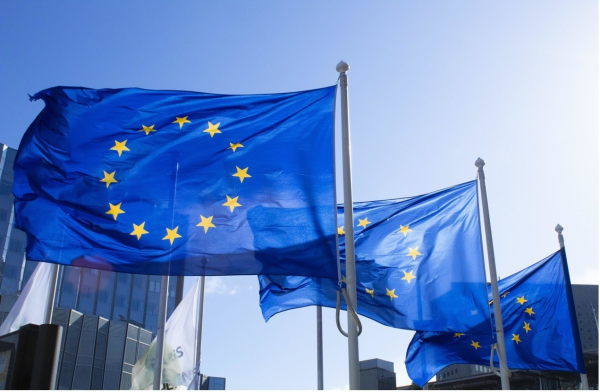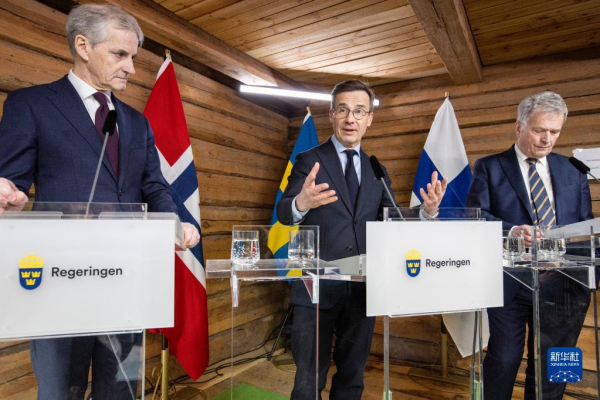The CCCEU Weekly Update 24 February 2023: A Year of War in Ukraine

A Year of War in Ukraine
Editor's Note: This edition of the CCCEU Weekly Update keeps you informed of developments key to China-Europe relations. Enjoy your reading and have a peaceful weekend.
Looking back, the war in Ukraine has left deep scars on Europe's economy and people's lives.
To start with, energy prices have surged, leading to high levels of inflation. The European natural gas market, as measured by the Dutch TTF natural gas price index, saw a significant increase from 88.89 euros per megawatt hour on February 23 to a record high of 339.2 euros per megawatt hour on August 26 last year.
Soaring energy prices have thrown the EU economy into a state of frenzied inflation, with the inflation rate surging from 5.9% in February to over 9.5% since June, peaking at 11.5% in October.
In addition, the value of the euro has been declining steadily, and the exchange rate with the US dollar has fallen below parity multiple times. The high prices have also dampened consumer demand, resulting in a sluggish economic growth rate for the EU.
The EU GDP growth rate fell to 0.3% and 0% in the third and fourth quarters of last year, indicating a significant slowdown. At the same time, price increases have prompted strikes in many parts of the EU.
Since July, the European Central Bank has had to raise interest rates several times to combat inflation. The most intuitive feeling of the EU people in the aftermath of the Russian-Ukrainian conflict is the rising cost of living - energy, house rent, food, transportation, and so on.
Although this year's warm winter has helped to alleviate the European energy crisis, the long-term impact of the Russian-Ukrainian conflict on the global political and economic landscape is difficult to overcome.
The rise of unilateralism and protectionism in some countries has previously threatened the new round of economic globalisation that began after World War II. The Russian-Ukrainian conflict heightened market concerns about security, prompting producers and policymakers to reduce the risk of uncertainty by shrinking supply chains from abroad.
The free allocation of resources around the world can result in greater economic efficiency, which is also the primary motivation for countries to promote trade and investment liberalisation and facilitation under the WTO framework. However, geopolitical tension is raising its ugly head and causing the rearrangement of industries or even the disruption of supply chains, which comes at the cost of economic efficiency.
Back on the war, China has always advocated resolving the Ukrainian crisis through politics. On February 19, Wang Yi, member of the Political Bureau of the CPC Central Committee and director of the Office of the Central Foreign Affairs Commission, said at the Munich Security Conference in Germany that China would continue to stand on the side of peace and dialogue.
On the one-year anniversary of the war in Ukraine, China released a long-awaited position paper outlining its stance on the conflict and urging the two sides to engage in peaceful negotiations, a move that sparked a new round of debates about the country's role and influence in peacekeeping.
In its 12-point position paper, Beijing reiterated its commitment to respecting the sovereignty of all nations, rejecting the Cold War mindset, ending hostilities, resuming peace talks, addressing humanitarian concerns, safeguarding civilians and prisoners of war, maintaining nuclear plant safety, reducing strategic risks, facilitating grain exports, ending unilateral sanctions, ensuring stable industrial and supply chains, and promoting post-war reconstruction.
Without doubt, the hope is that both sides can quickly return to the negotiating table and collaborate towards a peaceful resolution.
Senior Chinese diplomat expounds on trip to Europe, Russia
According to Xinhua, Wang Yi, director of the Office of the Foreign Affairs Commission of the Communist Party of China (CPC) Central Committee, on Wednesday briefed the media on his trip to Europe and Russia.
Wang has concluded his visit to France, Italy, Hungary and Russia as well as his attendance of the 59th Munich Security Conference.
UN emergency fund releases record $250 million to reach world's most vulnerable people, avert famine
With a record-high number of people needing humanitarian aid around the world, UN Secretary-General António Guterres today announced the largest allocation ever of US$250 million from the United Nations global emergency fund to help the most vulnerable people in some of the most forgotten crises and stave off famine.
Commission staff told to delete TikTok from work phones
According to The Brussels Time, the European Commission has banned staff members from having the Chinese social media app TikTok on their work phones, as well as on personal devices with work-related apps, over data safety concerns.
The Commission's measure is "misguided," a TikTok spokesperson told Politico in a reaction. "We are disappointed with this decision, which we believe to be misguided and based on fundamental misconceptions. We have contacted the Commission to set the record straight and explain how we protect the data of the 125 million people across the EU who come to TikTok every month."
Sweden, Finland, Norway vow to strengthen defense cooperation

According to Xinhua, the leaders of Sweden, Finland and Norway vowed to strengthen defense cooperation on Wednesday in the face of common security challenges.
Ukraine: General Assembly resumes emergency special session
According to UN news, on the eve of the one-year mark of the ongoing war in Ukraine, the UN General Assembly resumed its eleventh emergency special session on Wednesday to consider a new draft resolution aimed at restoring peace.
Microsoft rallies in Brussels to avoid EU block of Activision merger
According to Euractiv, Microsoft has signed fresh deals with Nintendo and Nvidia in the hopes of averting a move by the Commission to block its proposed $69 billion acquisition of gaming company Activision Blizzard.
The tech giant announced the two agreements on Tuesday (21 February) while key executives from the company were in Brussels for a hearing with European Commission's competition department.
The EU antitrust authority launched an investigation into the merger in November, reportedly sending a statement of objections to the company earlier this month.
What are experts talking about?
"Why did the EU carbon price rise to nearly 100 euros?" by Qin Yan and Tan Jueyue, analysts of Refinitiv Carbon Research Group of Lufthansa. The article points out that since February, the EU carbon price has risen continuously, hitting the 100-euro mark. This is mainly due to the fall in energy prices, especially natural gas prices, the rebound in European economic growth prospects, recovery expectations pushing up demand for carbon allowances and more aggressive hedging by energy companies. Analysts finally pointed out that although the energy crisis has improved, but the EU's energy prices are still higher than the level before 2021, the burden of energy costs are still high, so the crisis is not lifted, then soaring carbon prices will still spark controversy, potentially making policy makers must consider intervention measures.
Bruegel's website published an article titled "Is Europe failing on import diversification?" by Lennard Welslau and Georg Zachmann. The article argues that the discussion on European Union strategic sovereignty – the idea that the EU should not be dependent on other economies – there are broadly two approaches. The first is that a certain degree of self-sufficiency (autarky) is needed, at least in ‘strategic' industries. The second is that strategic sovereignty can be achieved by ensuring that strategically important imports from one country can be substituted by imports from another– in other words, through sufficient import diversification. In sum, the authors note, Europe's imports are generally sourced from an increasingly concentrated set of exporters. China has played a driving role in this development. The authors argue that since high import concentration affects Europe's resilience, tools that encourage more import diversification should be used to reverse this trend.
Please note: the English version of this issue is slightly different from our Chinese one. The views and opinions expressed in this article do not necessarily reflect the official position of the CCCEU.

 Login
Login Login
Login CCCEU and Gunnercooke Successfully Host Webinar on CSDDD and FLR Compliance to Guide Chinese Businesses
CCCEU and Gunnercooke Successfully Host Webinar on CSDDD and FLR Compliance to Guide Chinese Businesses Cultivating responsible China-EU business leaders essential to tackling global challenges
Cultivating responsible China-EU business leaders essential to tackling global challenges



